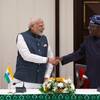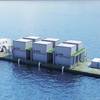Responding to intense political pressure, particularly from the U.S., leaders agree to boost production 7%
OPEC has seemingly bowed to U.S. pressure for cheaper oil by agreeing to higher output limits, immediately agreeing to turn up the taps by 1.45 million barrels daily, or seven percent. Iran, OPEC's second largest producer, opted out of the deal, saying it feared a price plunge and complaining about interference from Washington.
The action, which has been anticipated given the strong political pressures placed on the OPEC ministers, immediately sent petroleum prices into a tailspin, with Brent futures dropping $1.26 to $24.25 per barrel.
OPEC won applause from the Clinton administration, which said there was now no need to release national emergency supplies to ease election year political pressure from consumers irate at high gasoline prices. "This decision was made in the interests of producers and consumers in a prudent way. It will have a positive impact and moderate prices," Saudi Oil Minister Ali al-Naimi said.
President Bill Clinton said, "These increases will help sustain worldwide economic growth and provide greater balance between oil supply and demand."
Robert Priddle, head of the West's energy watchdog, called the deal a "step in the right direction" but said he was still worried about a shortage of petroleum inventories.
Naimi said OPEC was aiming to keep the price of benchmark North Sea Brent in the range $20-$25 a barrel compared to a recent nine-year high of $32.
"We're going to see a stockbuild in the second quarter. I would not be surprised to see Brent at $21-$22," said Gary Ross, head of New York oil consultancy Petroleum Industry Research Associates.
Iran, complaining of U.S. interference, pulled a last minute surprise by opting out of the accord, refusing to close the gap between its position on the output rise and the rest of OPEC. Nevertheless, the Islamic republic said it would raise production at the allocation in any case from April 1. That will add another 265,000 barrels daily.
"We will not lose market share," said Iran's OPEC governor Hossein Kazempour Ardebili. "We will certainly do the increase that would have been allocated (and) we will consider our position on increasing beyond that."
Kazempour said: "The U.S. intervention was beyond expectations. Never in the history of OPEC has this been experienced before. There was a lot of resentment and a lot of resistance."
"The United States was pressing hard for a substantial increase and most in OPEC were in favor of a big increase. Iran has expressed its displeasure at this political pressure," said Ross of PIRA.
Non-OPEC Mexico and Norway, having cooperated with OPEC in cutting exports when prices crashed, are shortly expected to announce their own supply increases.
Ross of PIRA said net new OPEC oil could be expected to rise by about a million barrels a day. That is not as much as OPEC is offering on paper because of recent leakage over official quotas.
U.S. Energy Secretary Bill Richardson said Washington had withdrawn its threat to release crude from the national strategic petroleum reserve. He predicted a 28 cent fall in U.S. wholesale gasoline prices by December.
San Francisco Federal Reserve President Robert Parry said: "It's a favorable development to the U.S. economy clearly, but I think it might be a stretch to say that this is a significant development with regards to prospects for monetary policy."
Subscribe for
Maritime Reporter E-News
Maritime Reporter E-News is the maritime industry's largest circulation and most authoritative ENews Service, delivered to your Email five times per week









